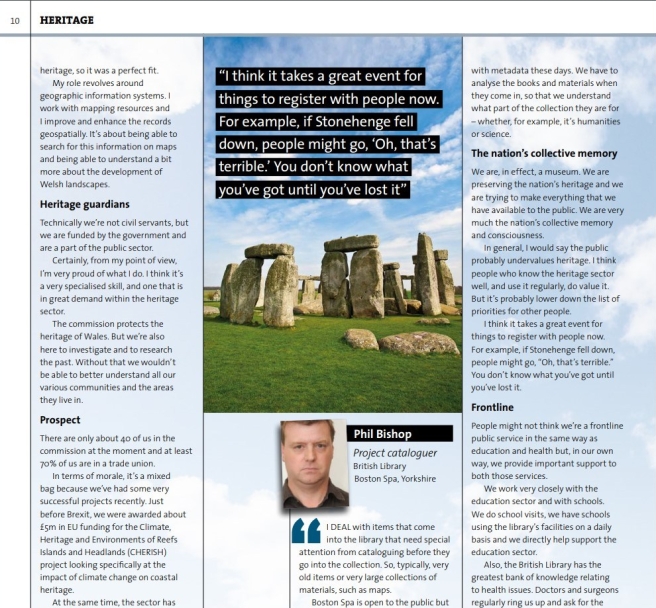
We have to think about future generations and the knowledge we can pass on. Some things you lose, and you can never get them back.
Prospect represents about 6,000 members across the heritage sector in the UK. Back in January 2018 Prospect Profile ran an article entitled Heroes of Heritage where they interviewed a number of people from the heritage sector. Phil Bishop, Boston Spa Section Chair, Equal Opps Coordinator and Trade Union Side Chair, was interviewed about his “day job” in the January issue of Prospect Profile.
This excerpt is from that article:
“I DEAL with items that come into the library that need special attention from cataloguing before they go into the collection. So, typically, very old items or very large collections of materials, such as maps. Boston Spa is open to the public but it’s not as well publicised as it should be. We have a reading room, like in London, but on the site we have most of the cataloguing operation. We also have the national newspaper library located here, which used to be in Colindale, north London.
Information management
I went to university and got a degree in information management and then got a job with the British Library in the cataloguing department, on the monograph processing side. You have to learn conservation and preservation skills to make sure items are handled correctly and go into the right part of the collection and are stored in the right environment. I’ve progressed in my 20 years here and been able to learn other skills, like project management. A lot of the cataloguing is all to do with metadata these days. We have to analyse the books and materials when they come in, so that we understand what part of the collection they are for – whether, for example, it’s humanities or science.
The nation’s collective memory
We are, in effect, a museum. We are preserving the nation’s heritage and we are trying to make everything that we have available to the public. We are very much the nation’s collective memory and consciousness. In general, I would say the public probably undervalues heritage. I think people who know the heritage sector well, and use it regularly, do value it. But it’s probably lower down the list of priorities for other people.
I think it takes a great event for things to register with people now. For example, if Stonehenge fell down, people might go, “Oh, that’s terrible.” You don’t know what you’ve got until you’ve lost it.
Frontline
People might not think we’re a front line public service in the same way as education and health but, in our own way, we provide important support to both those services. We work very closely with the education sector and with schools. We do school visits, we have schools using the library’s facilities on a daily basis and we directly help support the education sector. Also, the British Library has the greatest bank of knowledge relating to health issues. Doctors and surgeons regularly ring us up and ask for the latest journal on a particular medical procedure that is urgently required.
The things we lose
I’ve been an active rep for the past 12 years. We started to be affected by government cuts. We had a lot of redundancies and quite suddenly you could see the impact that it was having. Everyone is taking on more work and not getting paid any extra for it. Morale is quite low and has been for the past couple of years. There’s a strong feeling that over the past few years the jobs have been made harder and harder due to the funding cuts. We are all worried about the crucial skills that have been lost and are not being replaced. We have to think about future generations and the knowledge we can pass on. Some things you lose, and you can never get them back.
You can find the full article in the Profile issue 1/18, January 2018 by following this link: https://library.prospect.org.uk/id/2018/January/17/Profile-issue-18-January-2018
